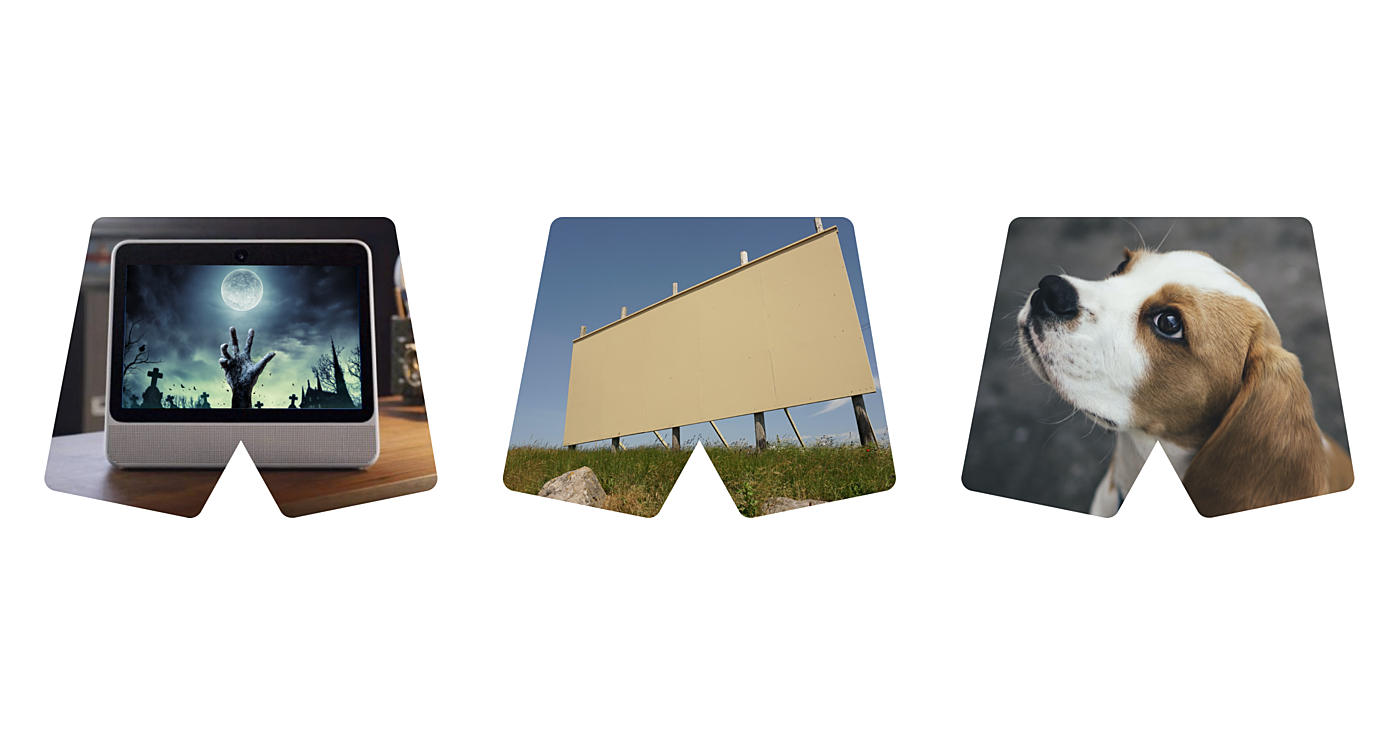
1
Remember Facebook Portal?
It’s a video calling device that launched two years ago, when Facebook’s privacy problems were in the news literally every day. The idea of that company at that moment in history asking you to install an always-on webcam in your living room was beyond absurd. And so, as everyone predicted, it flopped.
https://twitter.com/web/status/1049296371684130816
There was only one wrinkle: the product was actually... good?
The reviews were of course universally negative, but they typically said something like, “While the Portal excels in its intended role as a video phone for the modern era, I remain deeply uncomfortable with [blah blah blah].”
Nobody could deny that the Portal solved real problems with video calling:
- Stability — live video calls require a lot of bandwidth and CPU, and a dedicated hardware device is always going to outperform an overworked laptop with 73 Chrome tabs open.
- Comfort — Have you ever tried to gather a group of people around a laptop screen to make a Zoom call? It sucks. But the Portal has a wide-angle lens that solves the problem completely.
- “Smart Camera” — If you walk around the room, the Portal will zoom and pan to follow you, like an AI cameraman!
Seriously, this last thing is cool:
There’s a sort of tragic irony here. Facebook has launched so many ill-conceived products, it’s impossible to keep track of them — a mobile operating system, a phone, a Snapchat clone, another Snapchat clone, a mobile groups product, an email service, a cryptocurrency (tbd) — you get the idea.
With Portal, for the first time ever, they had a product that’s actually good on the merits — but it was held back. Purely by the Facebook brand! Imagine how annoying that must have been! I’m not saying you need to sympathize with Facebook or excuse their privacy violations in any way, but it’s just fascinating to consider.
Now, fast forward to the Coronavirus Era. Everything is different.
https://twitter.com/evancharles/status/1248022262336217089
The Facebook Portal is sold out. People are loving it. And perhaps strangest of all — they’re getting good press!
”Dammit, I love the Portal. There, I said it.” — WSJ
“If there ever was a time to say ‘fuck it’ and just relent to the Facebook Portal, now is that time.” — Buzzfeed
So, what lessons can we learn from this saga?
First, I think we should note how a great product in a great market can overcome a lot of problems. But if you only have a great product, it’s often not enough. Portal worked well from day 1, but the market for video chat products wasn’t desperate enough to overcome the Facebook weight.
Second, we should take this as a lesson of how random history can be. It’s an incredible accident of history that Facebook didn’t pull the plug on this product faster. Maybe they saw something in the data that gave them faith? Maybe they had vision? I do not know. But if Portal endures — which it very well may, thanks to network effects and momentum and whatnot — it will have been nothing short of a miracle.
Third, there’s something interesting to observe in the press quotes I included above. Facebook’s brand has been so damaged that it’s boring to drag through the mud some more. What’s interesting and contrarian is to say that some parts of Facebook might actually be… good? Perhaps the narrative clock has struck midnight, and the worst is over.
Or perhaps not.
2
By Adam Keesling
Two things are converging in advertising right now: high media usage and low advertising spend.
This combination is creating a unique opportunity to build a customer list at a discounted price, then capitalise on the audience once the economy gets back on track. Let me explain.
First, people are spending more time online. Verizon has pegged web use at a 27% increase compared to pre-COVID-19. Web usage is a good proxy for the increase in impressions / ad inventory, since most of the time on the web will be on websites that could serve ads to you. So we could estimate that advertising inventory is also up about 27%.
Next, companies are spending less on advertising. When the economy slows down, digital advertising is often the first expense to get cut. It’s like a faucet: you can push a lot of water through it, you can push a little water through it, or you can turn it off. When the money is tight, it’s a lot easier to turn off the digital advertising faucet then to lay off staff members, for example.
If you combine these things you get both increased supply and decreased demand, which should result in lower prices. And that’s exactly what we are seeing.
Social Fulcrum and Tinuiti are both reporting that CPMs on Facebook are down ~40% and cost per click (CPC) is following a similar pattern. (As a quick reminder, CPM is the cost of 1,000 views while CPC is the cost of a customer clicking an ad that links back to the company's site.)
So, ads are cheap. But you already knew that — here’s where it gets interesting.
The goal of the company is to have a customer buy something from them; CPM and CPC are only top-of-funnel metrics that entice customers to the website. Once a customer reaches the website, the company wants them to buy something. We use a metric (appropriately) called on-site conversion to measure how many of the people who visit a website actually buy something.
So how is on-site conversion doing? Not great. On-site conversion is down 53% from the week of March 1 to the week of March 22. This means that all else equal, even though ads are cheaper now, the cost to acquire a customer is more expensive than it was pre-COVID-19, because the people you’re advertising to are so much less likely to buy stuff.
This certainly leaves companies in a predicament. While they have an opportunity to buy cheap ads, the conversion rates are dropping at an even faster rate. It’s easier to get them to your site, but harder to get them to buy products once they are there.
However, it turns out there’s also a way to benefit from this situation.
Since ads are cheap, you can use them to bring customers into your ecosystem. Adding customers to your email list, for example, is cheaper now than it’s been in years. Remember: right now it’s easy to get people browsing, it’s hard to get people buying.
If you build an email list for cheap right now, once the economy bounces back, conversion rates will almost certainly revert back to their pre-COVID-19 levels, and you’ll have a large base to sell into.
It’s a simple mispricing: top of funnel is cheap and bottom of funnel is expensive. If you have the cash, investing in building a larger audience for your product is a wise decision right now.
PS — If you want to dive deeper on this topic, our friend Jacob from A Media Operator has a lot more detail in his subscriber-only post today. Luckily, he’s agreed to give Divinations subscribers free access. Click here to read it.
3
“DOG A FAKE HERO”
This was a real headline in The New York Times in 1908, from a story that contains an important (and hilarious) lesson on the power of incentives.
It went like this:
“Some time ago a child playing on the river bank fell into the water and was in imminent danger of being drowned. The dog, hearing the cries and the splashing, leaped over a hedge, ran down the bank, and plunged into the stream just in time to rescue the little victim. Naturally, the brave animal was made much of, and the father of the child, by way of recompense, presented him a succulent beefsteak.”
Ok, a dog saved a kid and got a beefsteak. Great, right?
“Two days later another child fell into the water and was rescued by the dog. The life-saver received the same caresses and another beefsteak. Up to this point there was nothing extraordinary. But rescues became more and more frequent. Hardly a day passed but that some unfortunate infant was brought safely to the bank by the dog after an involuntary bath.”
Weird!
“It began to be suspected that the neighborhood was haunted by a mysterious criminal, and a special watch was inaugurated. Then the truth came out.”
???
“It was the dog — the noble life-saver himself — that was the guilty one.”
!!!
“Whenever he saw a child playing on the edge of the stream he promptly knocked it into the water, and then none the less promptly joined in to the rescue. He had thus established for himself a profitable source of revenue.”
😅
I heard this story for the first time a few weeks ago while listening to the amazing Pessimist’s Archive podcast and I knew I had to share it. The dog reminds me of on of my favorite Charlie Munger quotes:
“I think I've been in the top 5% of my age cohort all my life in understanding the power of incentives, and all my life I've underestimated it. And never a year passes, but I get some surprise that pushes my limit a little farther.”
The dog story is so charming because we can relate. It makes sense that the dog would learn to “rescue” children in order to get a steak. In many ways, we do the same thing. We learn if we write contrarian articles we get a reward, so we buck the “Facebook is bad” trend and write a positive take on Portal. We learn there are cheap ads to be had, so we buy them up until our budgets are gone.
It’s not bad to respond to incentives. At some level, it’s inevitable. The question is what level of zoom you’re able to achieve.
Focus too narrowly, and you could get yourself in trouble, like the dog.
The Only Subscription
You Need to
Stay at the
Edge of AI
The essential toolkit for those shaping the future
"This might be the best value you
can get from an AI subscription."
- Jay S.
Join 100,000+ leaders, builders, and innovators

Email address
Already have an account? Sign in
What is included in a subscription?
Daily insights from AI pioneers + early access to powerful AI tools









Comments
Don't have an account? Sign up!